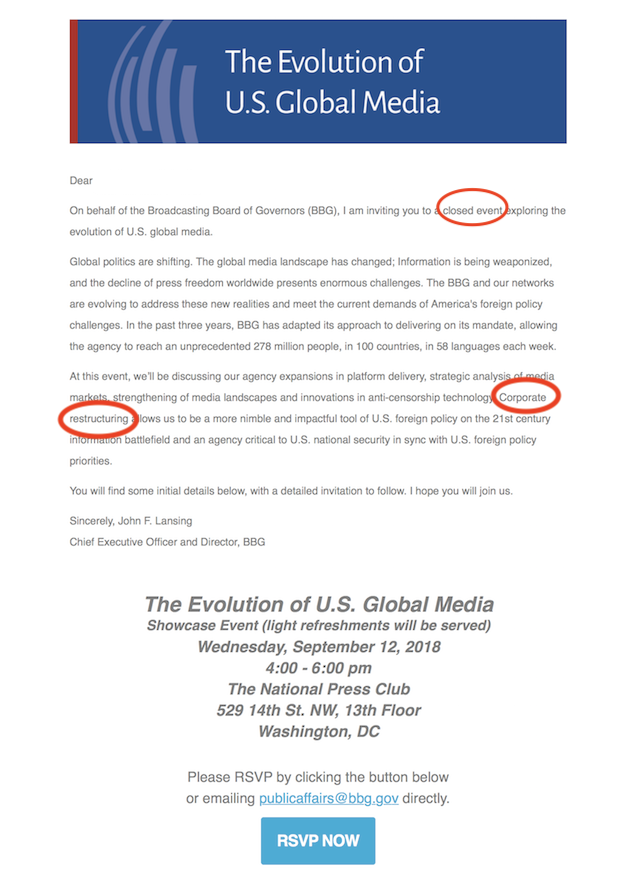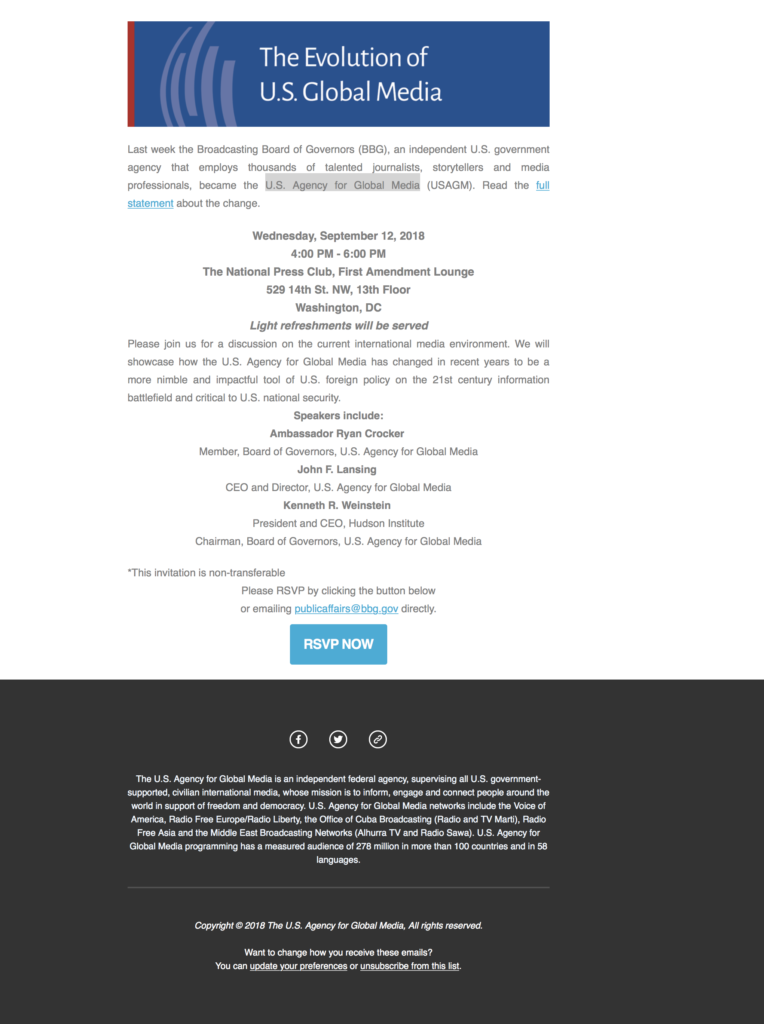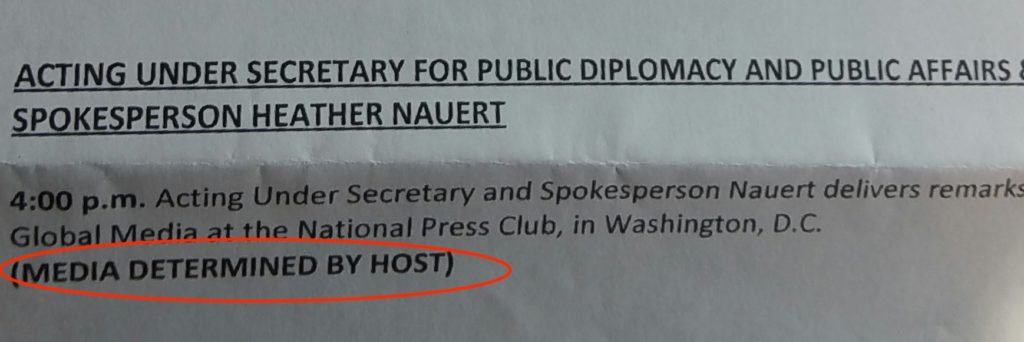BBG Watch Guest Commentary
This is part one of a multipart commentary on the newly named United States Agency for Global Media (USAGM), formerly known as the Broadcasting Board of Governors (BBG). The author is a former Voice of America (VOA) senior White House correspondent and international reporter Dan Robinson.
RE-BRANDED USAGM LIMITS MEDIA COVERAGE OF WASHINGTON PR EVENT: NO QUESTIONS WANTED
By Dan Robinson
A few weeks ago, a tree fell in Washington, D.C. A U.S. government agency, one that regularly boasts about its supposedly huge global impact, was “re-branded”. Ring the bells! Sound the trumpets!
But the re-naming of the Broadcasting Board of Governors, as the U.S. Agency for Global Media, appears to have had negligible impact inside the DC beltway, or globally.
BBG, now USAGM, has overseen all taxpayer-funded U.S. global media since the old U.S. Information Agency (USIA) was eliminated by President Bill Clinton.
Many Americans might think that the rare re-branding of any federal entity, especially above the “micro-agency” level, would make headlines. In the case of the BBG — classified as a mid-sized agency, with a budget of about $750 million — it produced pretty much a yawn.
In the hours after the initial announcement, BBG CEO John Lansing’s feed showed few reactions. Indeed, a recheck as this article goes to press showed 3/22/32 — just 3 comments, 22 retweets, and 32 likes — not exactly a huge outpouring of global response.
The choice of USAGM as the new name was met with a good amount of ridicule.
“Is that really the best name they could come up with?” remarked one former USIA and BBG official. “What an appalling name” said one former senior VOA correspondent.
Word that BBG would re-brand (the agency has ranked for decades at or near the bottom of federal employee satisfaction surveys) began leaking out months ago.
It was discussed briefly at a closed Town Hall meeting presided over by Lansing, who was appointed as CEO under President Barack Obama (but never formally confirmed by the Senate because under previous legislation he did not have to be confirmed). Also discussed was a plan, still being sold to Congress, to physically move the BBG headquarters (which includes Voice of America) from its decades-old location on the Washington mall, to somewhere in the DC vicinity (more about this in a future BBGW article).
NEWS AGENCY INITIALLY CLOSED EVENT, BARRED BBG WATCH COVERAGE
As BBG Watch reported in August, Lansing also announced that a “closed event” would be held September 12th at the National Press Club, “exploring the evolution of U.S. global media” with invitations sent out to a select group of people, and as it turned out, only carefully selected media.
Some immediate and important questions arose (the kind that one would only see reading BBG Watch, the only independent watchdog on the agency’s operations). The main one: Why would an event about a renamed U.S. government agency funded by taxpayers be cloaked in secrecy?
Also, the agency invitation made reference to “corporate restructuring.” But despite efforts of various officials in recent years to recast the agency as as the equivalent of a commercial “media company” — it isn’t. It’s a U.S. government body, regardless of its oft-cited “independence”.
As BBG Watch founder Ted Lipien wrote: “Arranging a closed event about a federal agency devoted to media freedom and transparency can only be described as a spectacularly stupid idea from a public diplomacy and public relations perspective, and one that could be easily exploited by Russian propaganda.”
FOIA AND PROTESTS TO BBG
As a former VOA news correspondent and language service chief for nearly 35 years, I received news of the September 12th event from sources. On September 4th, I sent a formal request to attend.
Here was the response, received from USAGM public affairs: “Thank you for your email. As space is limited the event is invitation only. We’ll keep you on our list for updates and future events about the U.S. Agency for Global Media.”
Breaking down this barrier, as absurd as it was unprecedented, required further steps.
In a Freedom of Information Act (FOIA) request, I asked for a list of invitees and those who RSVP’d. An email from Lipien to BBG Board members said the agency’s initial denial “under the flimsy excuse of insufficient space” would “open the agency to further charges of incompetence, insensitivity and hypocrisy . . .” and constituted “an unprecedented USAGM attempt to stifle independent investigative journalism in the United States.”
USAGM reversed its earlier rejection: “This is to inform you that we’ve added your name to the guest list for this event”. I still await a response from the agency regarding the FOIA for a full list of invitees and those who actually attended.
More Soon in PART TWO: FACT AND FANTASY – A FAMILIAR WASHINGTON GAME
 Dan Robinson retired in 2014 after 34 years with the Voice of America. In addition to his White House posting as senior VOA correspondent, he served as bureau chief in Nairobi, Kenya and Bangkok, Thailand. He was also the chief of the VOA Burmese Service and the Capitol Hill correspondent.
Dan Robinson retired in 2014 after 34 years with the Voice of America. In addition to his White House posting as senior VOA correspondent, he served as bureau chief in Nairobi, Kenya and Bangkok, Thailand. He was also the chief of the VOA Burmese Service and the Capitol Hill correspondent.



